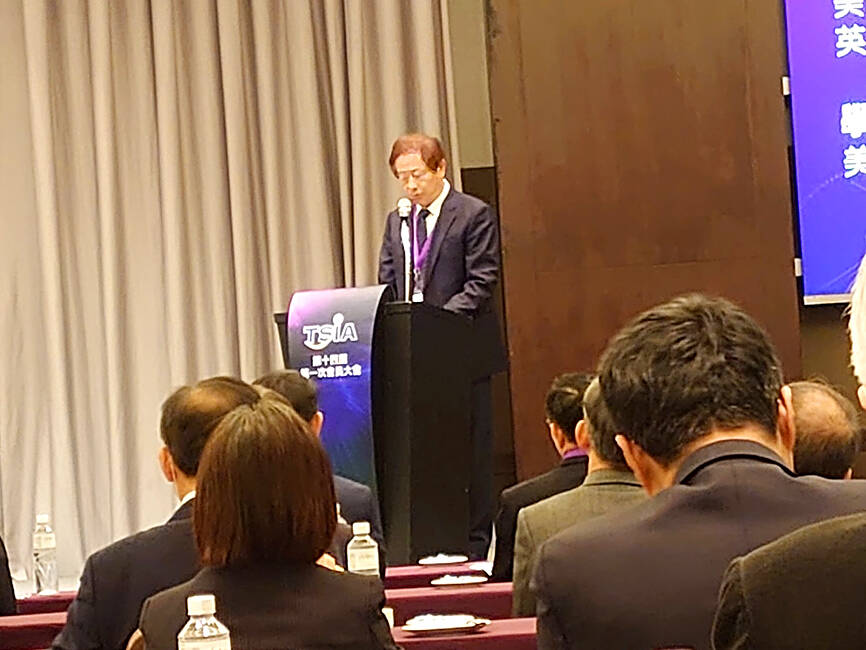Taiwan Semiconductor Manufacturing Co (TSMC, 台積電) yesterday called on the government to provide more equipment essential to advanced chipmaking, as it seeks to shore up its critical role in a US$550 billion industry.
Taiwan needs to build a fuller domestic semiconductor supply ecosystem, TSMC chairman Mark Liu (劉德音) told a conference organized by the Taiwan Semiconductor Industry Association.
Liu made the remarks in his farewell speech as chairman of the association. He is to be succeeded by TSMC vice president Cliff Hou (侯永清), who was elected yesterday.

Photo: CNA
US sanctions are curtailing the flow of vital technology to China, and Taiwan could play a bigger role in the global supply of machines needed to make chips, Liu said.
The TSMC chairman called on the government to assist Taiwan’s semiconductor companies to develop crucial technologies and enhance their capabilities to produce high-end semiconductor equipment and materials, saying it would help the nation fend off growing competition from China.
The US tightened its curbs on advanced semiconductor technology and equipment exports to China, which could change China’s role in local semiconductor component supply, Liu said.
The government should help businesses build a comprehensive semiconductor ecosystem to produce high-end manufacturing equipment and components, he said.
Liu said that some clauses in application guidelines for chip investment subsidies under the US’ CHIPS and Science Act are unacceptable.
South Korean memorychip maker SK Hynix Inc yesterday said that the application process is too demanding.
The South Korean government yesterday also said that the requirements that applicants disclose detailed technical and financial information, usually considered trade secrets, are onerous.
The US government demands that companies applying for subsidies under the CHIP and Science Act submit files containing information on how they calculate profits, the BusinessKorea magazine reported on Wednesday.
“We are still in discussions [with the US Department of Commerce]. Some conditions are unacceptable,” Liu said. “We hope [the department] will make some adjustments.”
The chipmaker’s operations in Taiwan would not be adversely affected by the US investment rules, Liu said.
TSMC, the world’s biggest contract chipmaker, has pledged to double its US investment to US$40 billion, as it is planning to build two advanced chip fabs in Arizona.
The first fab is scheduled to begin producing chips on 4-nanometer nodes next year, while the second is to start producing 3-nanometer chips in 2026.

SECURITY: As China is ‘reshaping’ Hong Kong’s population, Taiwan must raise the eligibility threshold for applications from Hong Kongers, Chiu Chui-cheng said When Hong Kong and Macau citizens apply for residency in Taiwan, it would be under a new category that includes a “national security observation period,” Mainland Affairs Council (MAC) Minister Chiu Chui-cheng (邱垂正) said yesterday. President William Lai (賴清德) on March 13 announced 17 strategies to counter China’s aggression toward Taiwan, including incorporating national security considerations into the review process for residency applications from Hong Kong and Macau citizens. The situation in Hong Kong is constantly changing, Chiu said to media yesterday on the sidelines of the Taipei Technology Run hosted by the Taipei Neihu Technology Park Development Association. With

A US Marine Corps regiment equipped with Naval Strike Missiles (NSM) is set to participate in the upcoming Balikatan 25 exercise in the Luzon Strait, marking the system’s first-ever deployment in the Philippines. US and Philippine officials have separately confirmed that the Navy Marine Expeditionary Ship Interdiction System (NMESIS) — the mobile launch platform for the Naval Strike Missile — would take part in the joint exercise. The missiles are being deployed to “a strategic first island chain chokepoint” in the waters between Taiwan proper and the Philippines, US-based Naval News reported. “The Luzon Strait and Bashi Channel represent a critical access

‘FORM OF PROTEST’: The German Institute Taipei said it was ‘shocked’ to see Nazi symbolism used in connection with political aims as it condemned the incident Sung Chien-liang (宋建樑), who led efforts to recall Democratic Progressive Party (DPP) Legislator Lee Kun-cheng (李坤城), was released on bail of NT$80,000 yesterday amid an outcry over a Nazi armband he wore to questioning the night before. Sung arrived at the New Taipei City District Prosecutors’ Office for questioning in a recall petition forgery case on Tuesday night wearing a red armband bearing a swastika, carrying a copy of Adolf Hitler’s Mein Kampf and giving a Nazi salute. Sung left the building at 1:15am without the armband and apparently covering the book with a coat. This is a serious international scandal and Chinese

COUNTERINTELLIGENCE TRAINING: The ministry said 87.5 percent of the apprehended Chinese agents were reported by service members they tried to lure into becoming spies Taiwanese organized crime, illegal money lenders, temples and civic groups are complicit in Beijing’s infiltration of the armed forces, the Ministry of National Defense (MND) said in a report yesterday. Retired service members who had been turned to Beijing’s cause mainly relied on those channels to infiltrate the Taiwanese military, according to the report to be submitted to lawmakers ahead of tomorrow’s hearing on Chinese espionage in the military. Chinese intelligence typically used blackmail, Internet-based communications, bribery or debts to loan sharks to leverage active service personnel to do its bidding, it said. China’s main goals are to collect intelligence, and develop a